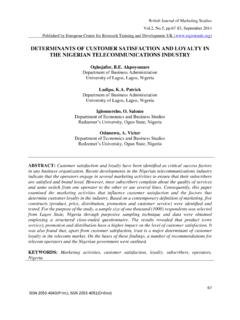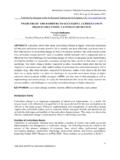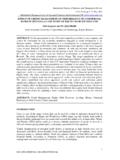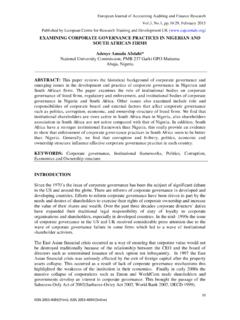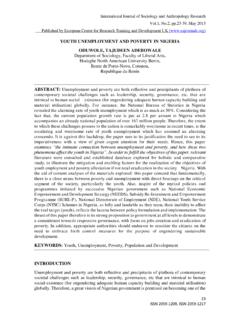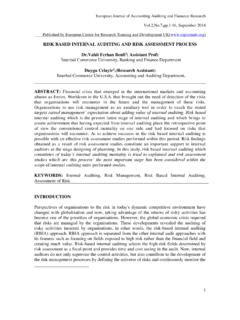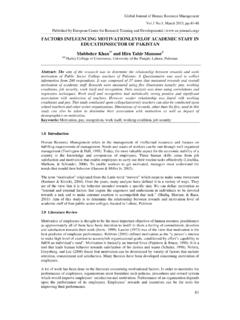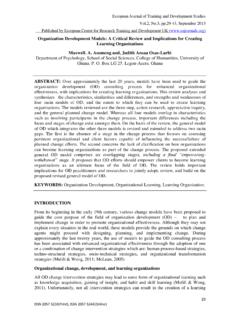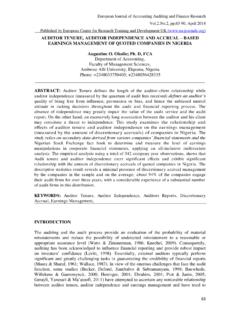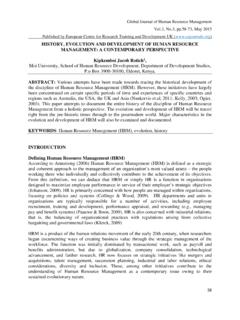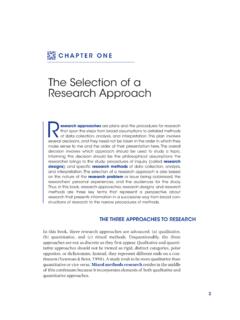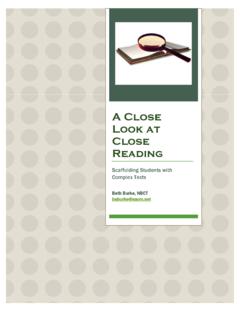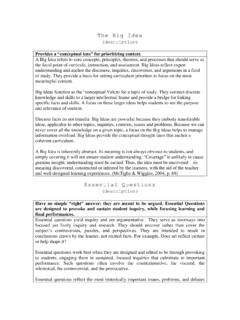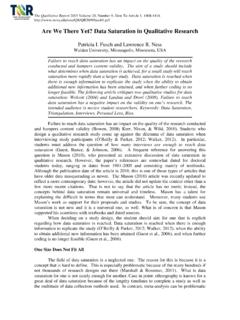Transcription of THE THEMES IN SAMUEL BECKETT'S PLAY WAITING FOR …
1 European Journal of English Language and Literature Studies , , , April 2020 Published by ECRTD- UK Print ISSN: 2055-0138(Print), Online ISSN: 2055-0146(Online) 31 THE THEMES IN SAMUEL BECKETT'S PLAY WAITING FOR GODOT Dr. Samer Ziyad Alsharadgeh English Language Center, Umm Al Qura University Makkah, Saudi Arabia E-mail: ABSTRACT: WAITING for Godot, is a play that prompts many questions, and answers none of them. As the title suggests, it is a play about WAITING : two men WAITING for a third, who never appears. And if he comes? one of Beckett s tramps asks the other near the end of the play. We ll be saved , the other replies, although the nature of that salvation, along with so much else, remains undefined: for both characters and audience, WAITING for Godot enforces a wait for its own. The two central characters, Vladimir and Estragon, wait for someone named Godot, who, as a stand-in for God, never arrives.
2 The title focuses the audience on the futility of human existence. The meaning of the name Godot is debated among scholars. Although Beckett wrote in French, it is possible that he wanted his audiences to consider the presence of the English word God in the name of the character who never shows up. (The similarity between the words Godot and God does not exist in the original French, in which God is Dieu.) It is possible, however, that Beckett named the character for a French bicyclist called Roger Godeau or for a French slang word for boots. KEY WORDS: observation, Absurdity, Existence, moonrise, emphasizing. INTRODUCTION SAMUEL Beckett was born on April 13, 1906, in Foxrock, in County Dublin, Ireland. As a youth, Beckett experienced severe bouts of depression that kept him bedridden; he reflected, "I had little talent for happiness," an observation that would later provide an undercurrent in much of his writing.
3 From 1923 to 1927, he studied Romance languages at Trinity College in Dublin, and in 1928 he moved to Paris to teach. In Paris, he became a friend of another Irish author for a time, James Joyce. Beckett briefly returned to Ireland to teach in 1930. After traveling in Europe, he settled in Paris, France, in 1937. When World War II broke out, Ireland remained neutral, so Beckett was able to stay in Paris even after the Germans invaded. He became active in the French Resistance and, after members of his resistance group were arrested, he and his then-companion (later wife) Suzanne D schevaux-Dumesnil fled to rural France for the remainder of the war, surviving on BECKETT'S farm work. Returning to Paris after World War II, Beckett produced many of his best-known works. WAITING for Godot was originally written in French (En attendant Godot). Beckett felt his mastery of the conventions of English concealed what he was trying to express, and the French tongue offered him a better medium for his ideas.
4 He later translated WAITING for Godot into English himself. European Journal of English Language and Literature Studies , , , April 2020 Published by ECRTD- UK Print ISSN: 2055-0138(Print), Online ISSN: 2055-0146(Online) 32 In WAITING for Godot, Beckett addresses an essential question of existence in two acts that mirror each other: Why do humans exist? Vladimir and Estragon, because they are logical beings, assume there is a point to their lives. With no confirmation, they have made an appointment with Godot, who may or may not be real. The audience is presented with two sets of characters: one pair Vladimir and Estragon waits passively, and another pair Pozzo and Lucky fills the time with purposeless journeying. Beckett claimed his works begin where the implied happy endings of other literary works leave off.
5 He strips away the false rewards of power, wealth, or marriage to present concentrated sparseness as a means of exploring existential questions. The absurdity and humor in his works are meant to liberate his viewers from the angst of these questions. He intends to free his viewers from the experience of trying to make sense of the senseless. The original French version of the play, En attendant Godot, was performed in full for the first time in Paris at the Th tre de Babylone in 1953. Despite BECKETT'S inexperience in theater, this first play required only superficial revisions during the rehearsals. Early audiences were bored, confused, and even angered by the play. Some critics disliked its rejection of purpose and meaning. Others, however, immediately recognized the play's revolutionary importance. Sylvain Zegel, who wrote the first review of the production, observed that Vladimir and Estragon represent all of humanity, trying to achieve at least the illusion of living.
6 It didn't take long for the play's popularity to spread. In 1953, an inmate of L ttringhausen prison in Germany, having gotten a copy of the script, translated it into German and performed it with his fellow inmates. He wrote to Beckett that the harshness of life and the endless WAITING depicted in the play resonated strongly with the prisoners. The first English-language performance, directed by Peter Hall at the Arts Theatre in London in 1955, was received with mixed reviews. Despite Hall's opinion that the dialogue was "real dramatic poetry," critic Philip Hope-Wallace called the language flat. Fortunately, the critic for the Sunday Times, Harold Hobson, was hooked, and the public soon caught what Hall later called "Godot mania". Since then, WAITING for Godot has been performed in many different ways around the world.
7 Beckett famously insisted that productions of the play remain faithful to his original dialogue, setting, and stage directions. Actors and directors, however, continue to put their own spin on performances. In a 1988 production at New York's Lincoln Center, superstar comic Robin Williams, playing Estragon, couldn't resist interrupting Lucky's monologue with antics and verbal outbursts. Also in 1988, the Dutch Haarlem Tonee lschuur Theater staged an all-female production, despite BECKETT'S objections. A Classical Theater of Harlem production in 2006 set the play in flooded New Orleans after Hurricane Katrina. Beckett, a master of form, strove throughout his life to produce plays, poetry, and prose pared down as much as possible to address essential questions of human existence. Come and Go (1967) contains only 121 words; "Lessness" (1970) comprises only 30 sentences, each appearing two times; and Rockaby (1980) runs for a duration of 15 minutes.
8 Beckett was awarded the Nobel Prize in Literature in 1969. He died on December 22, 1989, in Paris. European Journal of English Language and Literature Studies , , , April 2020 Published by ECRTD- UK Print ISSN: 2055-0138(Print), Online ISSN: 2055-0146(Online) 33 SUMMARY Act 1 Two shabby men who seem to be old friends meet on the side of a country road near a leafless tree. The first, Estragon, has been beaten up, and the second, Vladimir, suffers from groin pain and frequent urination. They consider repenting, though they don't know what for, and they discuss the different views in the Bible of the two thieves crucified with Christ. Getting bored, they consider leaving, but Vladimir says they are WAITING for Godot. They have asked him for something, though they aren't sure what, and they are WAITING for a response.
9 They consider hanging themselves as a diversion to pass the time or to speed up time, but they worry about one of them surviving alone. In the meantime, there is nothing to be done. Vladimir and Estragon hear a "terrible cry" just before two travelers arrive. Pozzo, a wealthy landowner, stops to eat and talk to the two men but mostly takes pleasure in hearing himself talk. He roughly orders around and abuses Lucky, a slave whom he keeps on a rope. Lucky is unresponsive except when following Pozzo's orders, and kicks Estragon when he tries to comfort him. When he is ordered to think, however, Lucky produces a jumbled speech that verges on profound meaning. He becomes increasingly passionate until the others angrily attack him to make him stop. Lucky collapses, and to be revived, he must be reacquainted with the burdens he carries. After the sun sets, he and Pozzo continue on their journey. Vladimir reveals that he and Estragon have met Pozzo and Lucky before at least he thinks so.
10 A boy arrives with a message from Godot he will not come this evening, but "surely tomorrow." It seems the two friends have also heard this message before, although the boy claims not to have come yesterday. Their questions about Godot reveal how little they know about the person they have been WAITING for. They ask the boy to tell Godot he has seen them. The moon rises and they decide to find a place to sleep, but neither moves. Act 2 When Vladimir and Estragon return, the tree has a few leaves on it, which is astounding for Vladimir and confusing for Estragon. Estragon has been beaten again, and he is angry that Vladimir, who is feeling better, seems happy without him. He suggests they part ways, but Vladimir discourages him. Vladimir reminds Estragon of their encounter with Pozzo and Lucky "yesterday," of which Estragon has only vague recollections.
